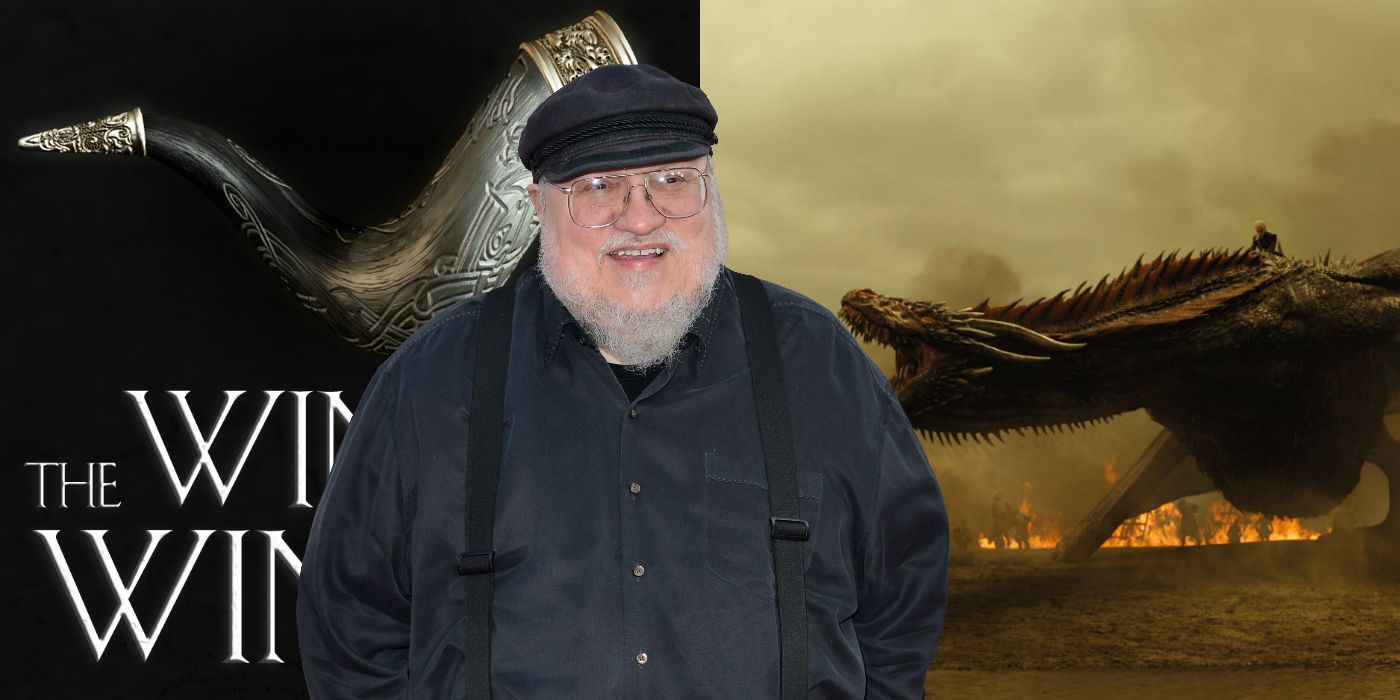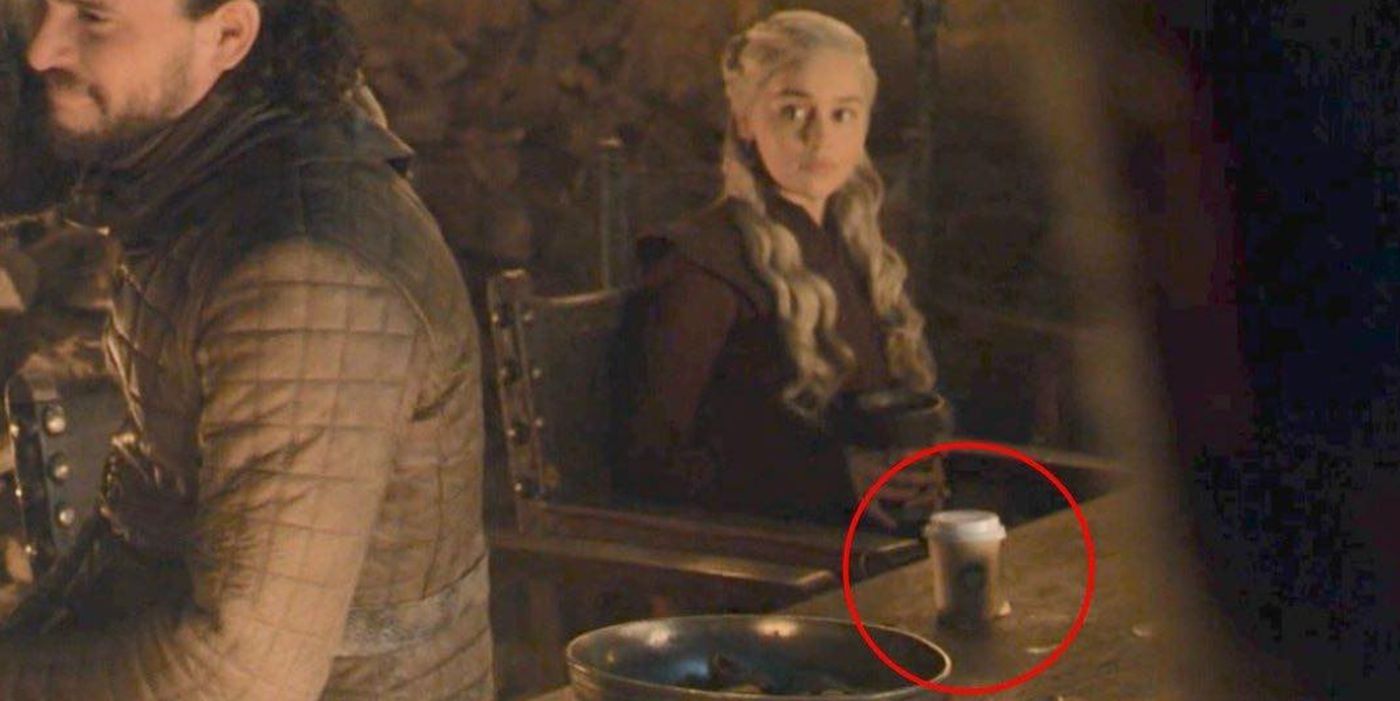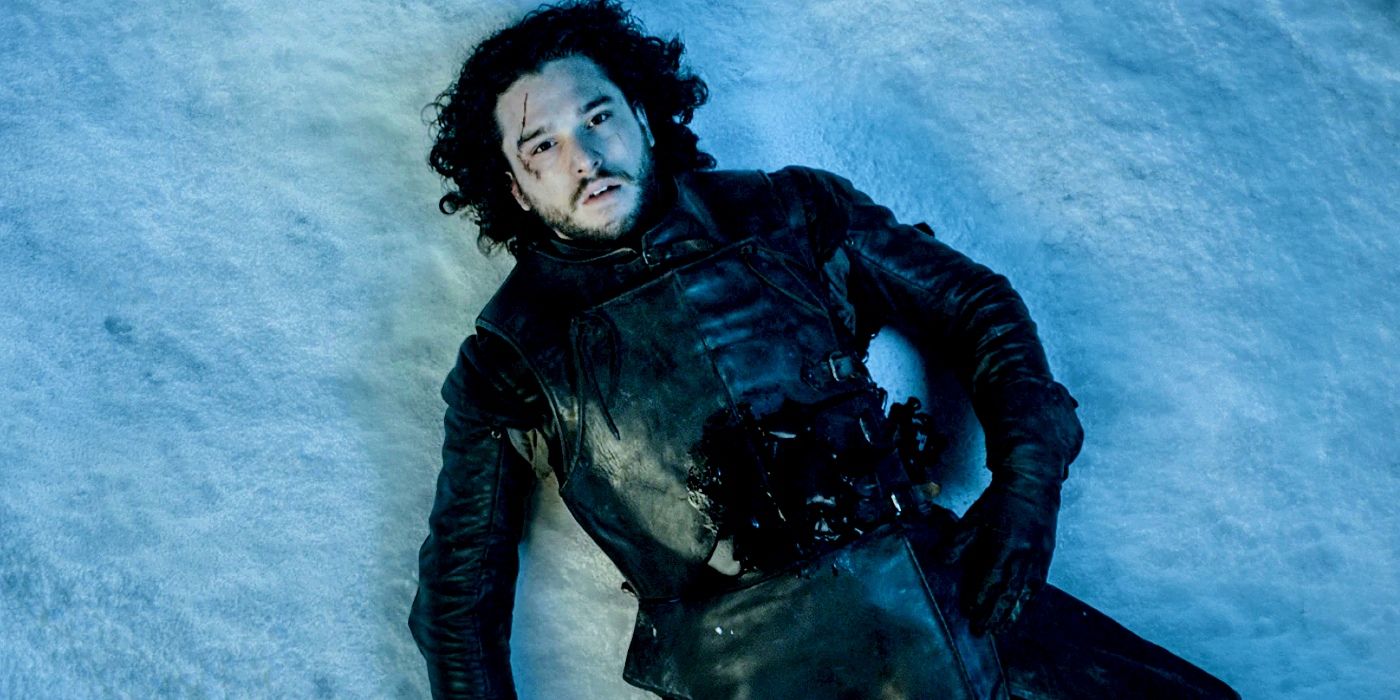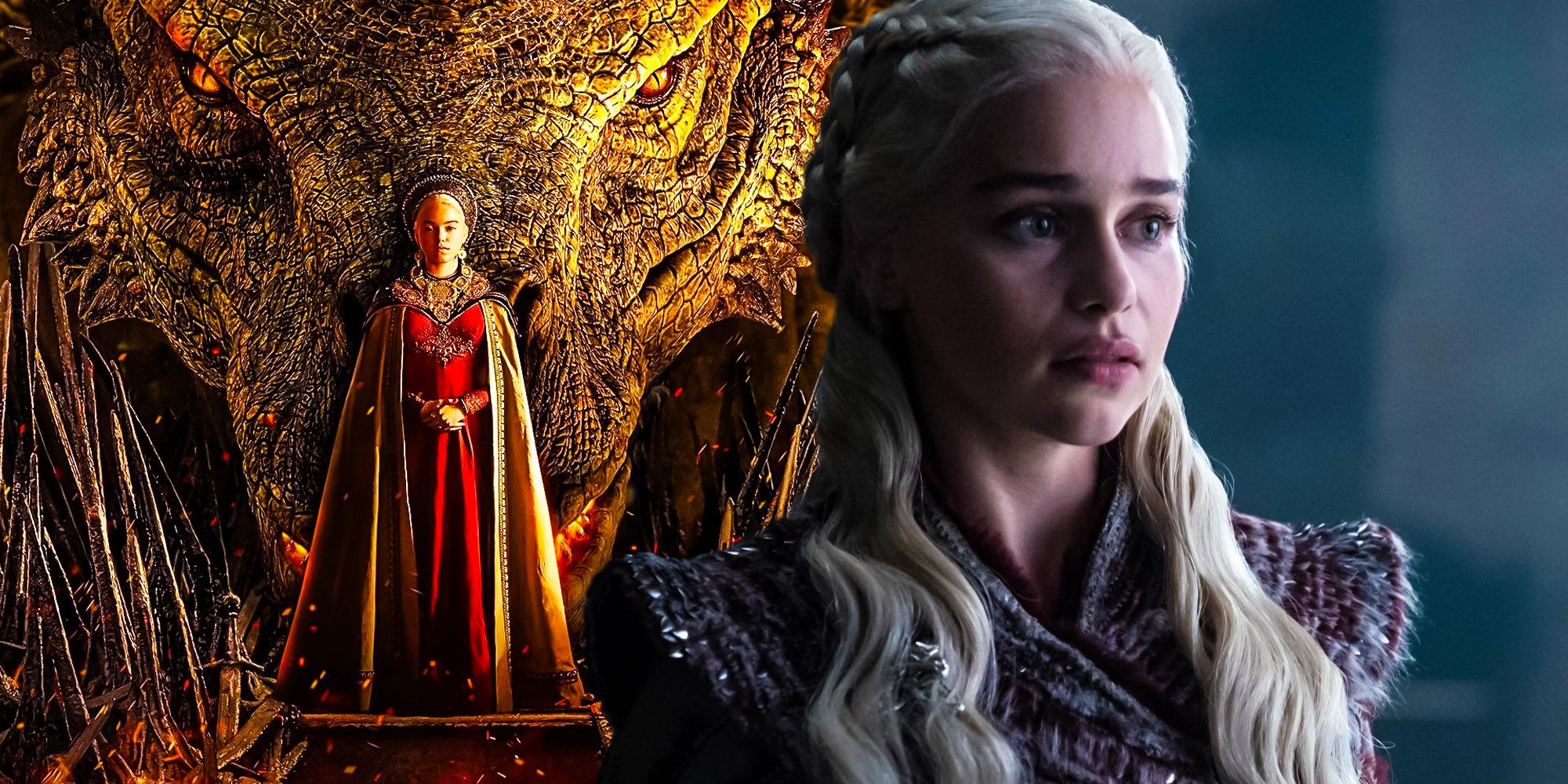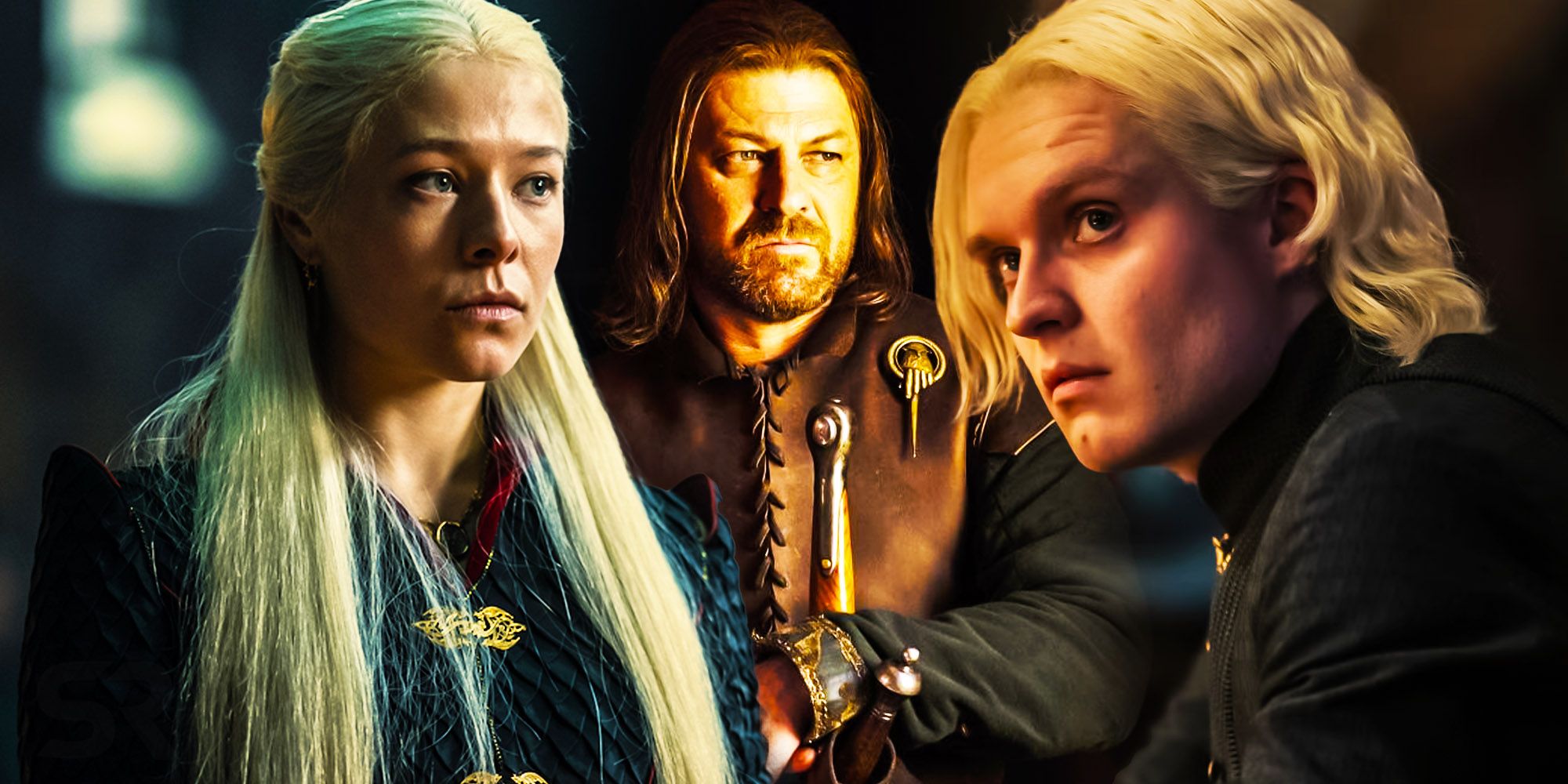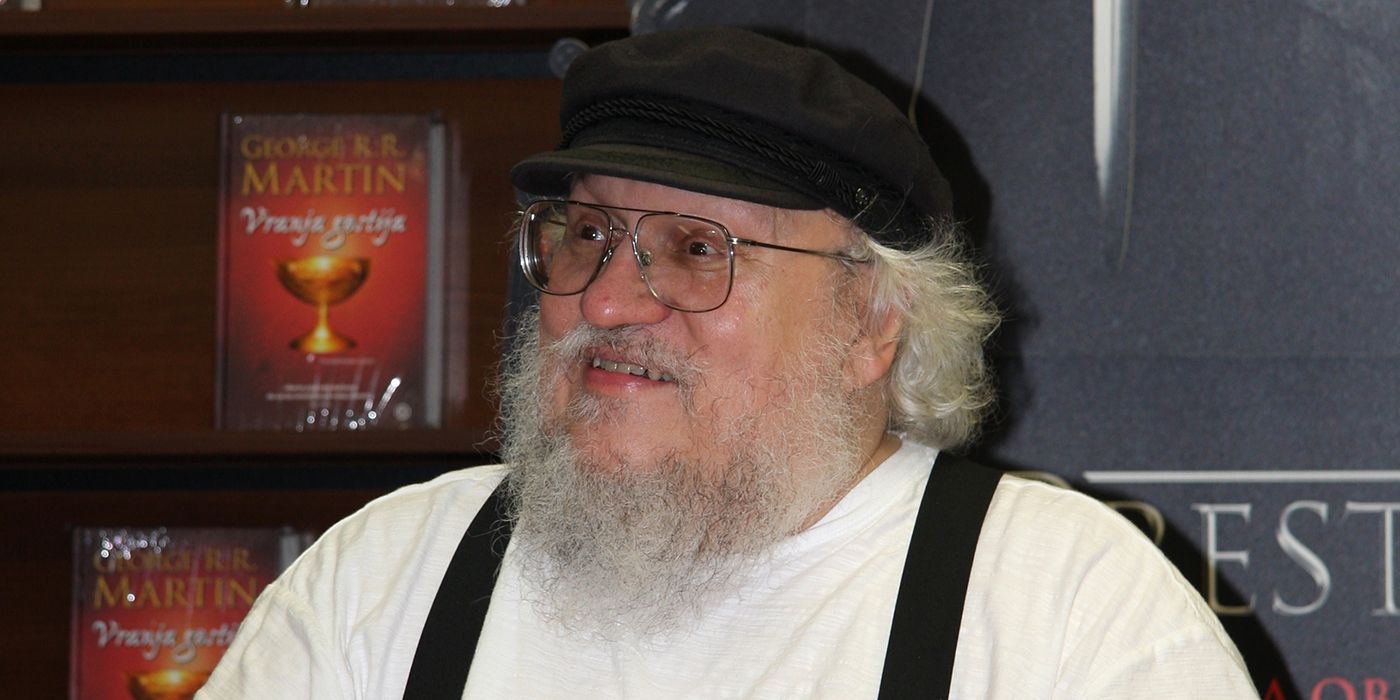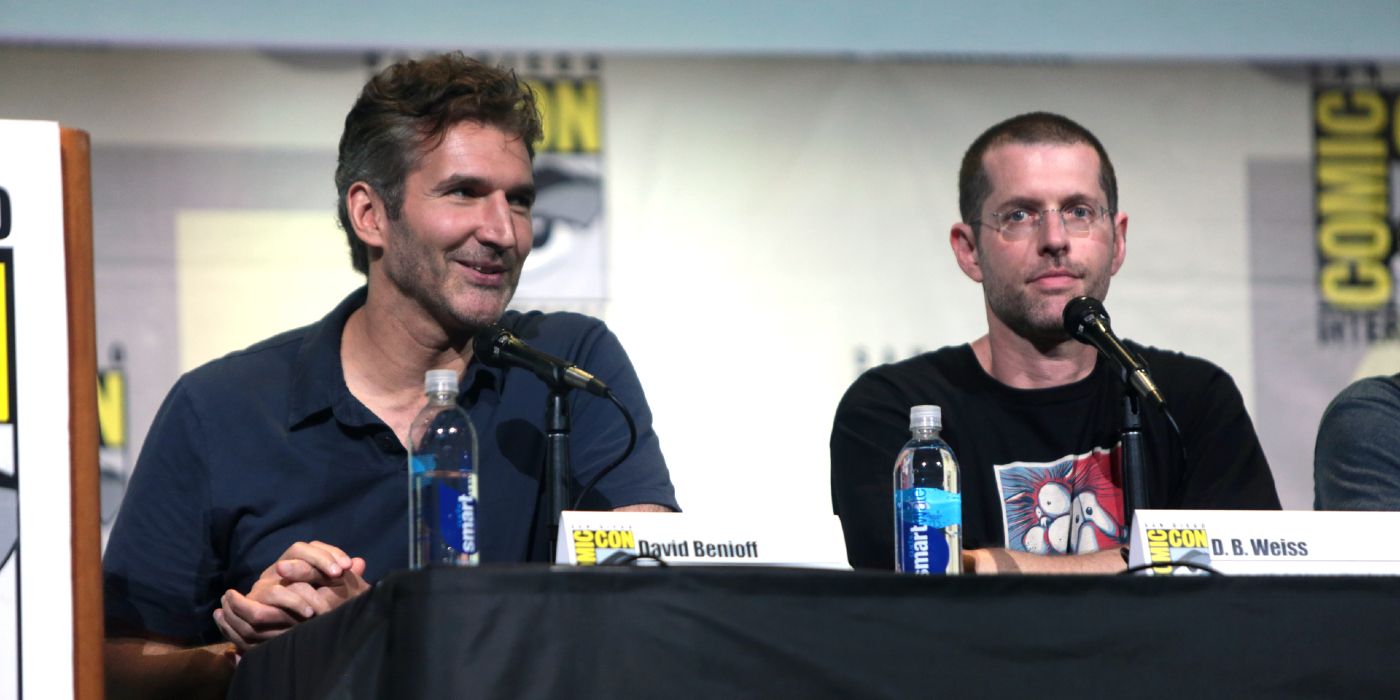After reforging the landscape of television, Game of Thronesseason 8 left fans disappointed and confused — and was, by most accounts, a lackluster ending to the epic series. George R.R. Martin’s A Song of Ice & Fire books always enjoyed cult popularity, but the stories reached huge mainstream success through the HBO adaptation. Game of Thrones was deeply political, visually groundbreaking, and featured an impressive cast of characters. However, when the show arrived at its shortened but highly anticipated conclusion, Game of Thrones season 8 let a lot of fans down.
The story of Westeros got bigger with each season and as much as Game of Thrones appeared invincible in the ratings, the series was also critically untouchable for much of its run. There was an unprecedented level of anticipation leading up to season 8, and with Martin’s books incomplete, the ending of Game of Thrones was a closely guarded secret. Game of Thrones season 8 faced the impossible task of satisfying audiences completely, but no one expected the ending to fail quite as spectacularly as it did. Looking back, a variety of factors led to the flawed final season of Game of Thrones.
Game Of Thrones Needed More Seasons
The Frantic Pace Of Season 8 Devastated Many Storylines
There are several problems with Game of Thrones season 8, but the majority trace back to one inarguable truth: the series needed much more time to arrive at a natural conclusion. The ending of Game of Thrones was announced well in advance, with confirmation coming while season 6 was still on the air. After audiences discovered only two seasons of Westeros action remained, they later learned those final seasons would also comprise a shorter episode count, and this caused concern since there was so much ground yet to cover at the time.
With the acclaim of season 6, many gave Benioff and Weiss the benefit of the doubt, but those initial misgivings proved justified. Since its debut season, Game of Thrones had been a slow build, spending time carefully crafting characters, interweaving their narratives, and exploring different parts of Martin’s fantasy world. While this measured pace could sometimes be frustrating, it was actually one of the show’s greatest strengths, giving the narrative and the colorful cast of Game of Thrones characters room to grow organically.
…the breakneck pacing took away the depth that helped make
Game of Thrones
so successful
By contrast, Game of Thronesseason 8 felt like a mad rush to the finish line. Drastically upping the pace, main players zoom around the map in record time, while the gripping character interactions Game of Thrones was once renowned for were curtailed to make room for plot.
Not only is the gear shift incredibly jarring, but the breakneck pacing took away the depth that helped make Game of Thrones so successful, replacing it with superficial scenes geared solely towards covering the narrative ground. George R.R. Martin himself has even admitted surprise that Game of Thrones ended when it did, claiming he expected the series would need to run far longer.
The Game Of Thrones TV Series Overtook The Books
The Lack Of Source Material Became A Problem Before Season 8
Even before Game of Thrones season 8, the show was beginning to stumble. There’s a clear correlation between Game of Thrones‘ drop in quality and the moment the HBO series overtook its source material. Benioff and Weiss never sought to adapt Martin’s books verbatim. Even in the earlier seasons, there are moments, characters, and storylines that deviate considerably. However, Game of Thrones follows each major part of the books and retains Martin’s character outlines. It took an incredibly detailed and widespread series of novels and diluted it into a cohesive, but still rich, TV story.
Unfortunately, the duo was less successful when left to their own devices in finishing the story. It’s impossible not to notice the point where Martin’s storytelling ends. The shocking narrative twists of earlier seasons give way to awkward attempts at subverting expectations, such as the moment when Arya kills the Night King. Deaths that provoked months of discussion became ones that lacked emotional impact.
The intricate plotting became more direct, with season 8 moving from point A to point B without subtlety or grace. Game of Thrones season 8 took the brunt of the flak, but the show’s decline can actually be traced back further. The more original material that seeped into the scripts, the more flaws started to emerge.
Characters Stopped Acting Like Themselves
The Rush Time And Lack Of Source Material Added To The Misused Characters
One massive problem audiences had with Game of Thrones season 8 was when their favorite characters suddenly stopped acting like their favorite characters. The most frequently cited example of such inconsistency is Dany’s decimation of King’s Landing.
While the Mother of Dragons had always harbored an inner darkness bubbling beneath the surface, she remained a staunch protagonist in season 8, and her decision to burn innocent people alive seemed to come out of nowhere. The combined triggers of a fragile ego, a lust for power, and genetic destiny were all present but certainly didn’t add up to the level of carnage Dany unleashed, leaving many to cry foul.
Jon Snow went from being one of the most compelling figures on TV to an inactive character who simply watched the events of the final season unfold and did nothing to contribute until the moment he killed Daenerys in the final episode. Game of Thrones‘ Jon Snow had many standout moments throughout the series, but it’s telling that none of them are in the final season, which should have been his time of glory.
Cersei and Jaime’s deaths also proved particularly divisive among viewers, with the general consensus claiming that neither got the end they deserved and neither acted in a way their respective arcs had been building towards. When the story writing pen is handed from one to another, there are shifts in character, and the lack of books to guide the TV series made the unstable characterization prominent. The need to wrap things up within two seasons played a considerable part in this.
The endpoint of Game of Thrones, with Jon Snow killing Daenerys and Bran sitting on the throne, isn’t problematic in itself, it just hadn’t been sufficiently built towards. With more episodes, Dany’s villainous turn and Bran’s royal rise could’ve been developed gradually and foreshadowed carefully, making the eventual big moments less confusing and contrived.
Game Of Thrones Season 8 Made Needless Mistakes
Small Errors Added To The Messy Feel Of The Final Season
Some of the Game of Thrones season 8 problems were not easy to avoid. More seasons would’ve been influenced by budget restraints, talent contracts, and non-creative factors. The issue of depleted source material also can’t be laid at the door of Benioff and Weiss. Even years after the series ended, the updates on The Winds of Winter have suggested the book series will not continue anytime soon. It would’ve been unrealistic to pause the TV series until Martin released more books, so the decision to move into original content was a necessary, if ultimately detrimental, one.
Visual gaffes can be found throughout
Game of Thrones
, but these seemed more frequent than before, contributing to a general sense of sloppiness compared to past seasons.
The Battle of Winterfell, which should have been the best battle in Game of Thrones, was disappointing to many fans who complained the darkness of the episode meant they couldn’t see what was happening. There is also the infamous Starbucks coffee cup seen in one season 8 scene. While not a huge flaw, it became a symbol of season 8’s messy execution.
Visual gaffes can be found throughout Game of Thrones, but these seemed more frequent than before, contributing to a general sense of sloppiness compared to past seasons. As for the story and plot, the sequence of events in the Game of Thrones finale feels haphazard and poorly planned.
Major Plot Points Never Paid Off
The Show Abandoned Key Storylines After Years Of Build-Up
When modern TV audiences talk about the success or otherwise of a finale, they don’t measure in terms of spectacle, drama, or excitement, but in satisfaction. Long-running series are an investment of time and emotion on the part of an audience, and if that effort isn’t paid off by the ending, the entire journey can feel like a wasted exercise. By this measurement, Game of Thrones season 8 was certainly a failure, as so many once-important plot points fell by the wayside.
The biggest victim of this was the long-running mystery of Jon Snow’s parentage. Among book readers, the R+L=J theory was central to the series for years, with Jon’s Targaryen heritage easily the biggest point of discussion at the end of each season. Sadly, Jon being a Targaryen had no impact on the Game of Thrones ending. The heroic bastard of Winterfell continued to be denied his birthright, and even after Daenerys died, Jon went North to live out his days far from King’s Landing — an ending that would’ve played out the same regardless of his parents.
The importance of the Night King and his recurring symbol was swiftly dealt with in a single episode. Bran and the Three-Eyed Raven remained a sizable unknown, many of the series’ prophecies went unfulfilled, the entire Dorne story was abandoned, the mysterious masked Quaith in season 2 wasn’t expanded upon, and the fate of Daenerys’ settlements in Essos remained ambiguous.
Game of Thrones ending lost sight of the show’s history for a reactive approach, ticking off what it could and ignoring the rest, and this left a large chunk of the audience feeling like the questions they’d been pondering for 8 seasons had all been for naught.
Season 8 Made Earlier Seasons Of Game Of Thrones Worse
It Makes Rewatching The Show A Chore
A big issue with Game of Thrones season 8 is not just that it was a disappointing finale for the beloved series, but that it retroactively ruined previous seasons. The rushed and nonsensical plot destroyed other established storylines such as Jon Snow’s faceoff with the Night King. The Night King proved himself a threat in the harrowing Hardhome attack and the final moment of him and Jon staring each other down promised an epic showdown. Arya’s skills made her a threat but her story was more tied to killing Cersei rather than the Night King/
Among the main characters in Game of Thrones season 8, Jon Snow fared the worst. Once the undisputed hero of the series, he ended up aimless. He spent much of the final season watching things happen instead of taking part in them, which made Jon’s previous resurrection in Game of Thrones season 6 feel all the more meaningless.
The fake-out death of who many felt was the main character of the show felt gimmicky at the time, but fans hoped it would at least have a significant impact on Jon’s story going forward. The final season proved what many fans feared; that the show didn’t have a good reason for bringing Jon back.
The arc that was the most painful to see become undone was that of Jaime Lannister. The show pulled off something extraordinary with Jaime who was the most hated character on the show from the first episode. The more that was revealed about him, the more complex he became, seen as a man who made plenty of mistakes but was on a path to save his reputation and prove himself a true knight.
The most important step in that journey was finally admitting Cersei was evil and leaving her which he did at the end of season 7. The fact that Game of Thrones season 8 sent him back to her to die suggests they never understood his character.
How House Of The Dragon Sidesteps Game Of Thrones S8’s Problems
The Prequel Series Adapts One Of Martin’s Completed Books
House of the Dragon seems poised to avoid the issues with Game of Thrones season 8 ending for a few reasons. Unlike its predecessor show, House of the Dragon is based on a book that Martin already finished — 2018’s Fire and Blood. This means that regardless of how long the show ends up running for and how many volumes of Fire and Blood it adapts, the series will never have to invent original material to achieve a complete ending.
This doesn’t mean it won’t take creative liberties, but the fatal flaw of Game of Thrones season 8 making up its own story in lieu of waiting for Martin can be avoided. Another significant issue with the Game of Thrones finale — the rushed pace, inconsistent travel speeds, and extremely muddy time jumps — won’t be as big an issue with House of the Dragon, since Fire and Blood already accounts for such leaps as part of its story.
Because the show follows many generations of Targaryen successors, zeroing in on the Targaryen civil war, it’s inherently broader in scope than Game of Thrones, which means that big story strokes are woven into its fabric from the beginning. This has helped the pacing stay consistent throughout and avoid the Game of Thrones pitfall of cramming too much into the ending.
HotD Is Retroactively Adding Weight To GoT Moments
The Prequel Shed New Light On Controversial Ideas
Some of Game of Thrones’ weird moments have been expounded upon by House of the Dragon, further pulling audiences into the lore and expansive universe that George R.R. Martin has created. House of the Dragon has almost completely reframed its parent series, adding a new perspective to crucial parts of Westerosi history such as the Targaryen family, their reign before the events of GoT, and, especially, what the Seven Kingdoms were like when dragons ruled the skies in larger numbers. One way the two series are connected overall is through Aegon’s dream, aka “A Song of Ice and Fire.”
Game of Thrones story is foreshadowed when King Viserys gives Rhaenyra the catspaw dagger that almost killed Bran Stark, and explains she must keep the realm together to face the upcoming threat from the far north, the White Walkers. The catspaw dagger and Aegon’s dream are the thread that holds the series together, creating a solid connection between Game of Thrones and House of the Dragon.
Another moment reframed by House of the Dragon is when Jon Snow is spared by Drogon, even after taking Daenerys Targaryen’s life. Game of Thrones scratched the surface with dragon lore and barely touched upon the connection that dragons have with their riders. House of the Dragon expands upon dragon lore, featuring 16 dragons, with most of them having a rider. Daenerys’ connection to her dragons makes sense in the context of HotD, especially with scenes like Laena Velaryon attempting to force Vhagar to kill her.
The prequel series explains dragons are more intelligent and nuanced than they are shown to be in GoT, making Drogon’s mercy towards Jon Snow less nonsensical. Daenerys Targaryen’s heritage is also reframed by House of the Dragon. When she is introduced, her brother’s diatribes about the former glory of their house sound like the murmurings of a madman — but HotD proves how prolific their reign was.
Rhaenyra says that Targaryens are closer to gods than to men, and their control over the dragons proves this bold statement. Viserys’ ramblings in Game of Thrones and his sister’s tenacity to put her family name back on the Iron Throne make much more sense in light of House of the Dragon.
The Targaryens had quite a successful time ruling Westeros for many generations, and Daenerys’ eagerness to put the Targaryens back in charge may find more support from audiences upon a rewatch. So, despite Game of Thrones season 8 being a huge disappointment, at least House of the Dragon is making some of those strange moments more digestible.
George RR Martin Had Little Input On Season 8
The Game Of Thrones Author’s Absence Was Notable
While the complaints that David Benioff and Dan “D.B.” Weiss had no source material for Game of Thrones season 8, some might wonder why they didn’t talk more to George RR Martin about the upcoming episodes and where the story was heading. Surely, they wanted to keep the ideas from the author in mind when finishing his story on HBO. However, it turns out they didn’t bother as Martin said he was “out of the loop” by the end (via New York Times).
When asked, George RR Martin said he was not involved much past season 5. In the final two seasons, he was completely out of the picture. It also wasn’t by choice, as Martin said if anyone wanted to know why he had no idea, they would “have to ask Dan and David.”
This has all changed with House of the Dragon, where Martin has a place at the planning table, reading scripts, sitting in on meetings, and previewing early cuts. If anyone wants to see what the shows would look like with Martin involved, HotD will give them a lot better look than the end of Game of Thrones.
What David Benioff & D.B. Weiss Said About Game Of Thrones Season 8
The GoT Showrunners Are Well Aware Of The Finale’s Backlash
David Benioff and D.B. Weiss were the creative core of HBO’s Game of Thrones, being the showrunners from season’s 1 to 8 and working closely with George R.R. Martin to ensure the Seven Kingdoms made it to the small screen without losing what makes the A Song Of Ice And Fire novels so popular. While it hasn’t been a hinderance to either of their careers in the time since, it’s also clear that Game of Thrones season 8 was far from a highlight in their filmography.
While it took several years, in 2024 the duo finally spoke out on the immense backlash to Game of Thrones season 8 and gave their perspective and thoughts and the final season. Speaking to THR, David Benioff revealed that, for a long time, he was incredibly troubled at one point by the negative reactions to the final season of Game of Thrones:
“You always hope everyone’s going to love anything you do and it would’ve been great if 100 percent of people loved it, but they didn’t. You can get so bogged down in public opinion that you spend your whole life googling things and trying to find people who felt one way or the other way.”
However, D.B. Weiss did add that, despite the online backlash, fans in real life have been nothing but supportive. The pair have thankfully never experienced anything that echoes the online toxicity when meeting fans offline and discussing Game of Thrones season 8:
“
There’s an underlying decency when people acknowledge you as a person and vice versa
.
There’s something that happens in the transition from human interaction to online that pushes things in a specifically aggro direction.”
In the time since Game of Thrones, David Benioff and D.B. Weiss have gone on to create shows like Netflix’s 3 Body Problem. The final season clearly didn’t hamper their careers, and it also, thankfully, doesn’t appear to have led to any difficult real-world encounters. However, the pair are also acutely aware of the online criticisms, and it’s incredibly likely the sub-par response to the final season of Game of Thrones will always be a consideration when creating endings for future projects.



